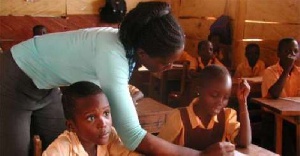Understaffing at Chasie primary and junior high school in the Wa East District of the Upper West Region has compelled the only two teachers in the school to man all the classes from kindergarten to JHS. With a student population of 350, the only two teachers, one of whom doubles as the head teacher, are forced to combine most of the classes in order to teach them daily. The Chasie basic school has over the years grappled with lack of teachers, staff accommodation and furniture for pupils. A pavilion put up to serve the KG class has been abandoned for animals due to lack of staff.
A major disincentive to teachers receiving postings here is the lack of connectivity to telecommunication services in the community.
Despite the numerous challenges, the first batch of eight candidates registered by the school in this year’s Basic Education Certificate Examination (BECE) came out with a hundred per cent pass.
Head teacher of the Chasie D/A primary school, Mahama Anuma Gorge, solely handles about 300 pupils from kindergarten to class six.
He is compelled to combine some of the classes to be able to handle all of them in a day. “We have a lot of challenges. For instance, we have problems with staffing, at this time I am the only teacher in the school,” he told TV3 He explained there was another teacher with him but that teacher “was transferred to the JHS.
I am hoping to get two additional teachers… for the second week of reopening, I am still doing cleaning because I am the only one”. He said under staffing is not the only challenge facing the school, noting they also lack of furniture. At the junior high school, students attend classes only when their only teacher is in school.
The classrooms were virtually empty when TV3 visited the school. The team’s presence in the community attracted some students to come to school. William Sidifu, who takes on 50 students at the school, says performance has been good despite the challenges.
He explained that at the time that he was teaching at the primary school, they were two teachers at the JHS “ but I used to come to the JHS to support them and now the performance is good”.
He said the distance from Wa is very far and that makes their coming to the community a challenges noting, “though they have done postings, I am not sure whether all the teachers will report…if those teachers come and will collaborate like we did, it will yield good results”.
The Wa East District topped the list of BECE performance last year with 48 per cent pass. A Circuit Supervisor for Jayiri circuit, Bruno Tanzule, noted the unavailability of mobile phone network in the area is affecting communication with teachers but he has managed to have a workaround.
“Chasie is the only community under my circuit that do not have [mobile phone] network, and communicating to teachers on current events is a problem” He said he has made some arrangements with the head teachers, “so mostly I send them a text message when there is an urgent information, then the teachers too every Monday will need to climb the Chasie hill to check if there a message for them.
“What they also do is that, they climb the hill again on Friday to check for available information,” he added, and appealed to the government and the telecommunication service providers to support the people of Chasie. The Wa East District Director of Education, Evans Kpebah, told TV3 the five teachers have been posted to the Chasie primary school and three to the JHS. He however lamented the challenges leading to teachers not accepting postings to the community.
“We sent five teachers to the Chasie primary school and three to the JHS even though it is not enough, the challenges that leads to teachers not accepting postings to the community is a worry to us; no network, poor accommodation and the rest.
Touching on the lack of furniture for the school, he said he would collaborate with the regional Ghana Education Service stores to ensure the school is provided with furniture. For these school children, they have at least demonstrated their readiness to learn, and will only need a push by the government to be able to climb the academic ladder.
General News of Monday, 17 October 2016
Source: 3news.com













